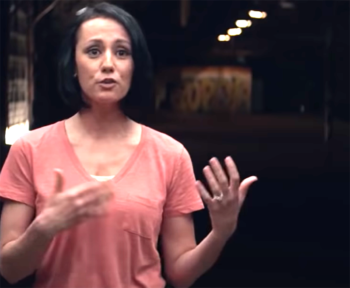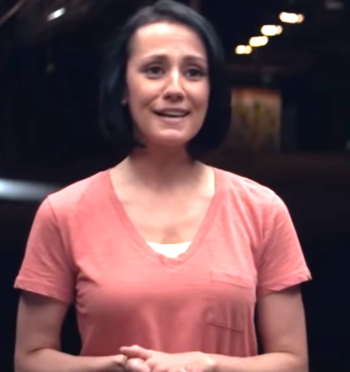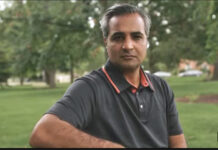“I knew that I was extremely hated by Allah,” Aisha from Jordan says.
Born of an American mother into a conservative Muslim family, Aisha had racked up a lot of sins: first she questioned Allah, Mohammad, the Koran and salvation.
Then she came to America with her mother looking for better opportunities and got an abortion.
“I was feeling so much fear and hopelessness,” she says on a StrongTower27 video.
Even though her family was entrenched in Islam, her dad was an alcoholic who kicked her and spat on her. “He called me names that no father should ever call his daughter,” she says.
Other than his besetting sin, he tried to keep the traditions of Islam religiously.
Aisha found no love in her family or in her religion.
“I felt like I could never keep up or measure up to what was expected,” she says. “And my family wasn’t too keen on my asking questions.”

Mom was mortified by the downward slide of the family. She even feared for her own life. So she asked her husband to move the family to America where her kids could learn English and have better job prospects.
He agreed, and they moved in 2000, while he stayed in Jordan. His alcoholism only worsened.
Longing for love, Aisha got a boyfriend in high school and got pregnant at age 17. Lying on the bathroom floor with the positive pregnancy test, she cried. She couldn’t tell her dad; he would kill her out of Islam’s call for “honor killing.”
“He would have murdered me, literally,” she says.
Aisha couldn’t tell her Mom; she would tell her Dad.
Feeling like she had no options, she made the terrible choice to kill her baby.
 “That was very hard for me because I always valued life,” she says. “I always daydreamed about what it would be like to hold my baby one day. To have gone through that was very devastating for me. I struggled with shame, embarrassment, depression, anxiety and self-worth.”
“That was very hard for me because I always valued life,” she says. “I always daydreamed about what it would be like to hold my baby one day. To have gone through that was very devastating for me. I struggled with shame, embarrassment, depression, anxiety and self-worth.”
Her attempt to fill the void with things of the world left her empty.
“I was going down a dangerous and dark and downward spiral,” she admits. “I knew that my sins were deep and unforgivable in Islam. I knew that I was so extremely hated by Allah.”
In her quest for forgiveness and hope, she actually opened the only “holy book” she knew and read Surah 4:168-169: Those who disbelieve and commit wrong Allah will never forgive them, nor will he guide them to a path. Except the path of Hell.
“I remember reading that and feeling so much fear and hopelessness,” she says.
 “Allah, I don’t know who you are. I don’t know if you even exist,” she prayed. “I’ve been praying to you for 27 years, and I’ve never felt your presence.”
“Allah, I don’t know who you are. I don’t know if you even exist,” she prayed. “I’ve been praying to you for 27 years, and I’ve never felt your presence.”
She wept bitterly. In the depths of despair, her mind began to consider suicide.
“If there’s no form of forgiveness for me in Islam, what’s the point of me living?” she reasoned.
Then something happened that was totally unexpected.
“As I was crying I heard an audible voice,” she remembers. “I heard the name, ‘Jesus.’”
With tears streaming down her face, she looked up to Heaven and raised her hands.
“Jesus, I don’t know who you are, but if you are who they say you are, please reveal yourself to me because I can’t go on living life like this anymore,” she prayed.
“That was the first time that I ever felt from praying any form of peace whatsoever,” she recalls.
She found a new boyfriend who was different. One day, she spied a Bible in his room. She asked to go to church with him and to hold Bible studies with his grandparents, whom she watched and found intriguing.
“They had this joy, they had this love, they had this peace and this freedom,” she rattles off. “I’ve always wanted what they had.”
Then she stumbled across Romans 5:8: “But God proves his love for us that while we were yet sinners, Christ died for us.”
It was a stark contrast with what she had read in the Koran.
“God’s love for us is not a response to our goodness but in spite of our lack of goodness,” she says.
“At that moment, I realized how different it is from being a Muslim and being a Christian,” she says.
She surrendered her life to Jesus, was born again, and then baptized.
For years, Aisha struggled with anger towards her father. Four years ago, she told dad over the phone about the forgiveness of Jesus. He was dying of his alcoholism and she expected him to reject Christ, but he enthusiastically received Jesus.
“I lived with so much shame and condemnation, with all these things that just weighed me down all these years,” she says. “The only freedom I found from that was in Jesus Christ.”
If you want to know more about a personal relationship with God, go here
Michael Ashcraft sells bamboo steamer baskets online to supplement his life as he writes Christian journalism.




